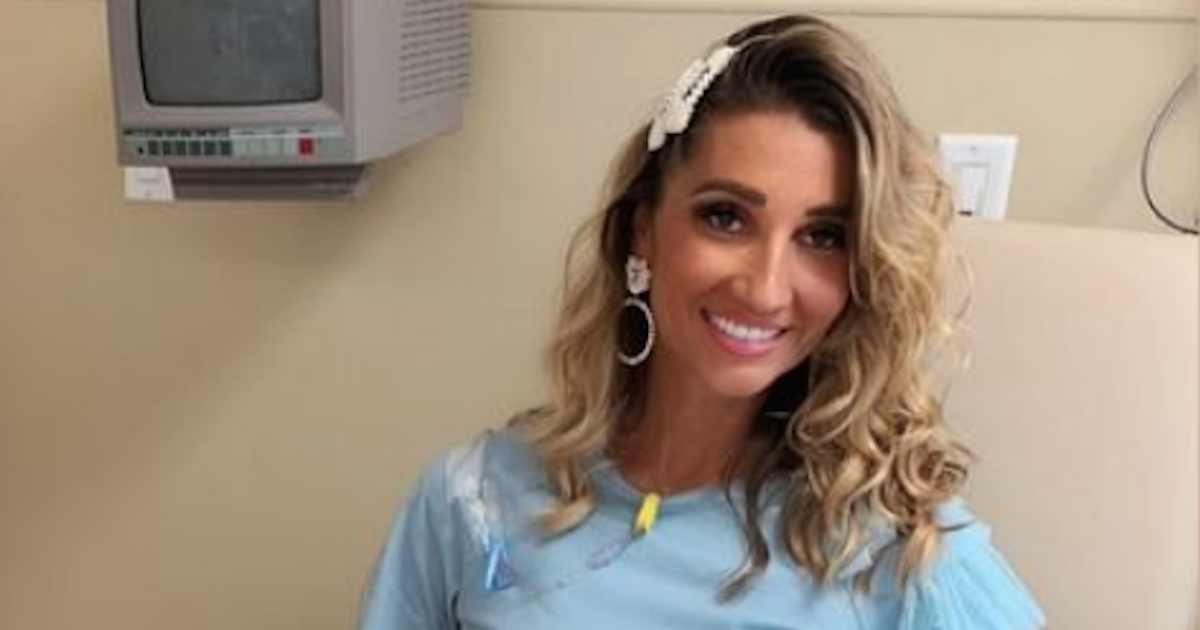Life After Colon Cancer
- Josie Krysiak was misdiagnosed for more than one year before learning she had stage three colon cancer. After being told she had a parasite and pushing doctors for a correct diagnosis, the 41-year-old mom of three is hoping to inspire others to advocate for themselves when something doesn’t feel right.
- The term colorectal cancer is used to describe cancers that begin in the colon or the rectum so some people just use the term colon cancer if that's where the disease began.
- One of our experts says colon cancers can be prevented when polyps are found early. And with colorectal cancer cases in younger people on the rise, the recommended age for beginning screening has been moved from 50 to 45.
- When it comes to treatment for colon cancer at stages one, two and three, there is the potential for a curative effect with surgical resection. One of our experts says all patients with stage one to three colon cancers undergo surgery "if they're healthy enough to tolerate it."
Before receiving her cancer diagnosis, Krysiak visited multiple doctors and naturopaths in search of an answer, only to have them all misdiagnose her, she explains on social media.
Read More
“I begged him for one [CT scan] but he said no. So, at the end of the day, please be your own advocate, listen to your body, and push for it,” she urged her viewers at the end of the footage.
Luckily after following her gut feeling that something wasn’t right and pushing for an answer, she was diagnosed with stage three colon cancer and needed surgery to remove a massive tumor, most of her colon, and seven lymph nodes.
She dubbed her surgery a “life-saving colectomy.”

Both her diagnosis and surgery came one week after she traveled with her husband and three daughters to Jamaica for a beach getaway.
After “12 brutal rounds of chemotherapy, 51 hours of chemo every other week for six months” Krysiak, who confidently shows off her “warrior scar” on her stomach, rang the bell at her hospital to commemorate being cancer free.
Last January, when she celebrated being cancer free for three years, she shared a compilation of clips from her cancer journey, captioning the post, “I humbly consider myself a walking miracle.”
Krysiak, who is thankful her hair never fell out amid treatment and that her cancer never spread to her organs, continues to share her story on social media to inspire others to advocate for themselves.
Understanding Colorectal Cancer
The term colorectal cancer is used to describe cancers that begin in the colon or the rectum so some people just use the term colon cancer if that's where the disease began. The cancer develops when abnormal lumps called polyps grow in the colon or rectum. It takes up to 10 years for a colon polyp to actually become cancer, according to SurvivorNet experts.
RELATED: How Is Rectal Cancer Treated Differently Than Colon Cancer?
Colorectal cancer, like all cancers, presents its own unique challenges for patients on the road to recovery. But Dr. Heather Yeo, a surgical oncologist and colorectal surgeon at New York Presbyterian Weill Cornell Medical Center, wants to remind people how far the treatment of this disease has come.
"One of the most exciting things about my job is that we've made a lot of progress on treatment options," Dr. Yeo says in a previous interview with SurvivorNet. "However, patients are still while they're living longer, they are still living with colon cancer, and so I think it's really important that we talk about how some of the things in your life affect you."
Screening
Dr. Yeo also emphasizes the importance of colorectal cancer screenings such as colonoscopies because most colorectal cancers can be prevented early with screening.
"You Shouldn't Die From Embarrassment": Colon Cancer Can Be Prevented
"In the United States, on a national level, colorectal cancer has been decreasing for the last 20 years," Dr. Yeo says. "And much of that is thought to be directly due to screening for colon cancer."
Even still, colorectal cancer cases are rising among younger people. And in the United States alone, rates have increased every year from 2011 to 2016 by 2 percent among people younger than 50. Because of this increase, the United States Preventive Services Task Force has recently updated its colorectal cancer screening recommendations to begin at age 45 instead of 50.
"We know that colon cancers can be prevented when polyps are found early," Dr. Yeo said. "Lowering the screening age helps somewhat with this. But access to care is a real problem."
And increasing access is crucial to making sure that we don't see racial disparities within the world of colorectal cancer. Whites and Asians are significantly more likely to be up to date with their colonoscopies than African Americans, Latinos and Native Americans.
Research suggests that tailoring colon cancer screenings to each person's individual risk may be beneficial. If you are not yet 45 but have concerns about your risk, talk to your doctor. Ask about your individual risk based on your lifestyle and family history and find out when screenings would be right for you.
Symptoms of Colon Cancer
Colon cancer might not immediately cause symptoms, but there are signs to look out for.
Below are possible symptoms:
- A change in bowel habits, such as diarrhea, constipation or narrowing of the stool that lasts for more than a few days
- A feeling that you need to have a bowel movement that's not relieved by having one
Rectal bleeding with bright red blood - Blood in the stool, which might make the stool look dark brown or black
Cramping or abdominal (belly) pain - Weakness and fatigue
- Unintended weight loss
It is important to note, however, that displaying some of these symptoms does not mean you have colorectal cancer. You could also have colon cancer and not display any of these symptoms. Regardless, it is important to bring up any symptoms to your doctor should they arise.
Treating Colon Cancer at Stages One, Two and Three
When it comes to treatment for colon cancer at stages one, two and three, there is the potential for a curative effect with surgical resection.
Colon Cancer Stages One, Two and Three
"As long as it hasn't spread outside of the local area, it's still considered a curable colon cancer," Dr. Yeo told SurvivorNet.
According to Dr. Yeo, all patients with stage one to three colon cancers undergo surgery "if they're healthy enough to tolerate it." But there's more nuance to the possibility of additional treatment for stages two and three.
"Stage 2 a little bit more in between," she said. "It really depends on kind of the depth of the tumor into the colon wall and the risk that it has to spread.
If a stage two colon cancer has "bad features" identified by a pathology report, chemotherapy might be the right move.
"For example, if when they look at the pathology slides under the microscope, if they see that it's involving some of the vessels nearby, then that is a higher risk factor," she explained. "And then, those patients might be more likely to benefit from chemotherapy."
Stage three colon cancers have spread to the lymph nodes. So, these patients "at least need a conversation of chemotherapy," according to Dr. Yeo.
"For our patients with 3 or higher, they all need chemotherapy," Dr. Yeo said.
Leading Experts Urge Us to Be Proactive
"If I had any advice for you following a cancer diagnosis, it would be, first, to seek out multiple opinions as to the best care," National Cancer Institute Chief of Surgery Steven Rosenberg told us in a previous interview, "because finding a doctor who is up to the latest of information is important."
As we highlight in several areas of SurvivorNet, highly respected doctors sometimes disagree on the right course of treatment, and advances in genetics and immunotherapy are creating new options. Also, in some instances the specific course of treatment is not clear cut. That's even more reason why understanding the potential approaches to your disease is crucial.
At the National Cancer Institute, there is a patient referral service that will "guide patients to the right group depending on their disease state so that they can gain access to these new experimental treatments," Rosenberg says.
Cancer Research Legend Urges Patients to Get Multiple Opinions
Furthermore, getting another opinion may also help you avoid doctor biases. For example, some surgeons own radiation treatment centers. "So there may be a conflict of interest if you present to a surgeon that is recommending radiation because there is some ownership of that type of facility," Dr. Jim Hu, director of robotic surgery at Weill Cornell Medical Center, tells SurvivorNet.
Other reasons to get a second opinion include:
- To see a doctor who has more experience treating your type of cancer
- You have a rare type of cancer
- There are several ways to treat your cancer
- You feel like your doctor isn't listening to you, or isn't giving you good advice
- You have trouble understanding your doctor
- You don't like the treatment your doctor is recommending, or you're worried about its possible side effects
- Your insurance company wants you to get another medical opinion
- Your cancer isn't improving on your current treatment
Be Pushy, Be Your Own Advocate, Says Leading Expert
Bottom line, being proactive about your health could be a matter of life or death. Learn as much as you can from as many experts as you can, so that you know that you did your best to take control of your health.
Contributing: SurvivorNet Staff
Learn more about SurvivorNet's rigorous medical review process.


